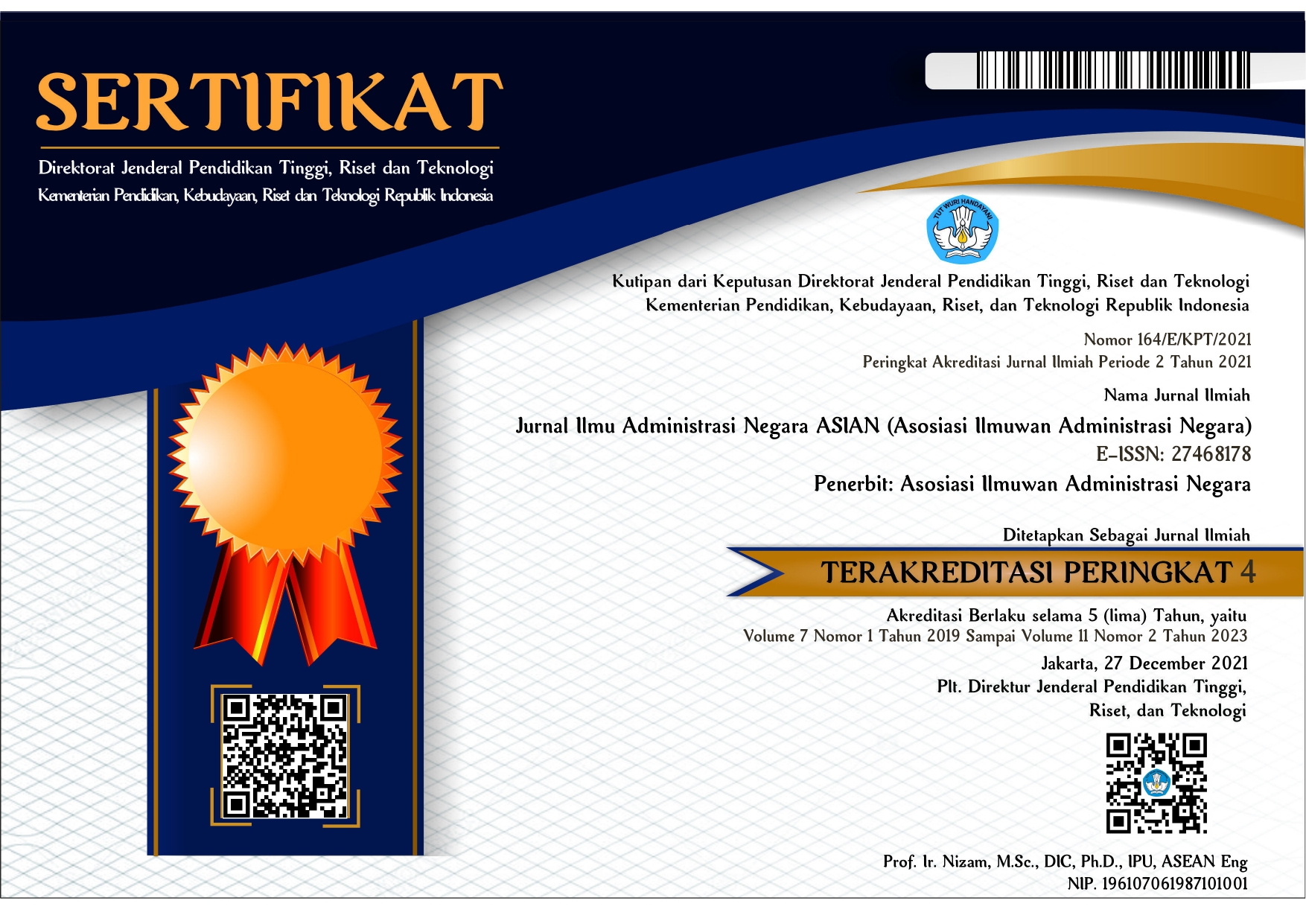Inovasi Publik Servis Menggunakan E-Government di Kantor Kependudukan dan Pencatatan Sipil Kabupaten Banjarnegara
 Abstract views: 424
,
Abstract views: 424
,
 PDF downloads: 301
PDF downloads: 301
Abstract
The purpose of this study is to determine online innovation in Dindukcapil Banjarnegara, the successful elements of online innovation, government, private sector, sustainability community and local wisdom value. It is for the purpose. Revision of writing qualitative methods, data collection, interviews, and documentation. The information providers are the villages, youth, Dundukcapil and the ADMINISTEK services in the private sector, the village employees, the deputy statement area and the Dandukcapil operator, Dindukcapil's manager. The results of this study indicate that the introduction of innovation is progressing steadily. There is a support for support and local autonomy for potential elements, but it is not perfect yet, but the private sector and the potential and values communities are not yet perfect. There are still private parts that do not want to cooperate, but the local value of wisdom is used as the basis of innovation stability.
Downloads
References
Agus Joko Purwanto, Wilfridus B Elu. 2017. Inovasi dan Perubahan Organisasi. Tangerang Selatan. Universitas Terbuka.
Ahyar H, dkk. (2020). Buku Metode Penelitian Kualitatif & Kuantitatif.
AngunaYP, dkk. (2015). Inisiatif pengembangan e-government dalam pelayanan publik di Dinas Koperasi dan UKM Kota Malang. Jurnal Administrasi Publik. Vol.3, No. 1, 80-88. Diakses dari: https://media.neliti.com/media/publications/80955-ID-upaya-pengembangan-e-government-dalam-pe.pdf.
As Husain. (2022). Pelayanan Publik Berbasis Kearifan Lokal : Kearifan Lokal. Indonesia: CV. Syakir Media.
Bloom N, Reenen J Van. (2013). Teori Tentang e-goverment, inovasi. NBER Work Pap. Published online. Hal:89.
Hardani, dkk. (2020). Metode Penelitian. Yogyakarta. Penerbit Pustaka Ilmu.
Khoiron AKAM. (2019). Metode Penelitian Kualitatif. Published online 2019:171.
Mariano Sabino. (2018). Penerapan E-Government Dalam Pelayanan Publik di Kabupaten Sidoharjo: Pembahasan, hal. 11. Diakses dari: https://repository.unair.ac.id/80061/3/JURNAL_TKP.04%2018%20Mar%20p.pdf
Muluk, Khairul. (2008). Manajemen Pengetahuan adalah kunci keberhasilan inovasi Pemerintah Daerah. Jatim: Banyumedia Publising.
Musrak dkk.(2019). Penguatan nilai-Nilai Kearifan local dalam Penyelenggaraan Pemerintahan Desa di Kecamatan Sinjai Tengah Kabupaten Sinjai. Jurnal Ilmiah Administrasita, Vol 10, hal.138. di akses dari: https://jurnalumsi.ac.id/index.php/administrasita/article/download/151/120.
Nurdin, W. N., & Rahmat, R. (2022). Obstacles of Public Service Innovation in the Licensing Services Sector. KnE Social Sciences, 7(9), 381–396. Diakeshttps://doi.org/10.18502/kss.v7i9.10952
Pasalong, Harbani. (2008). Teori Administrasi Publik. Bandung: Alpabeta.
Sangkala. (2014). Innovative Governance; Konsep dan aplikasi. Capiya Publishing. Surabaya.
Suwarno, Yogi. (2008). Inovasi di Sektor Publik. STIA-LAN Jakarta
Yusuf SYM. (2019). Inovasi Pelayanan Publik Berbasis E-Government Pada Kantor Pelayanan Bersama Samsat Mataram. Media Bina Ilmu; 13(8):1433. Diakses dari : doi:10.33758/mbi.v13i8.221
Quispe J. Rkpd (2023). Rencana Kerja Perangakat Daerah (Kabupaten Banjarnegara) tahun 2023. hal:88–100.
LKJIP DINDUKCAPIL (2023) rev new. Published online 2023:61.
Copyright (c) 2024 Jurnal Ilmu Administrasi Negara ASIAN (Asosiasi Ilmuwan Administrasi Negara)

This work is licensed under a Creative Commons Attribution-ShareAlike 4.0 International License.
Authors who publish with this journal agree to the following terms:
1. Copyright on any article is retained by the author(s).
2. The author grants the journal, right of first publication with the work simultaneously licensed under a Creative Commons Attribution License that allows others to share the work with an acknowledgment of the work’s authorship and initial publication in this journal.
3. Authors are able to enter into separate, additional contractual arrangements for the non-exclusive distribution of the journal’s published version of the work (e.g., post it to an institutional repository or publish it in a book), with an acknowledgment of its initial publication in this journal.
4. Authors are permitted and encouraged to post their work online (e.g., in institutional repositories or on their website) prior to and during the submission process, as it can lead to productive exchanges, as well as earlier and greater citation of published work.
5. The article and any associated published material is distributed under the Creative Commons Attribution-ShareAlike 4.0 International License








